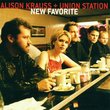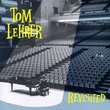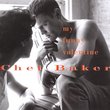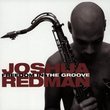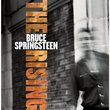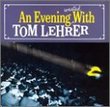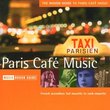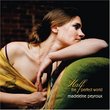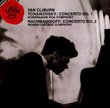| All Artists: Michael Tilson Thomas, San Francisco Symphony Aaron Copland Title: Copland: The Populist Members Wishing: 0 Total Copies: 3 Label: RCA Release Date: 7/26/2010 Genres: Special Interest, Classical Styles: Marches, Opera & Classical Vocal, Ballets & Dances, Ballets, Forms & Genres, Concertos, Theatrical, Incidental & Program Music, Historical Periods, Modern, 20th, & 21st Century, Instruments, Keyboard, Symphonies Number of Discs: 1 SwapaCD Credits: 1 UPC: 090266351121 |
Search - Michael Tilson Thomas, San Francisco Symphony Aaron Copland :: Copland: The Populist
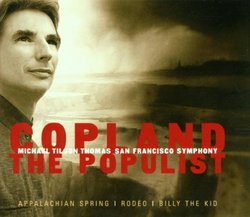 | Michael Tilson Thomas, San Francisco Symphony Aaron Copland Copland: The Populist Genres: Special Interest, Classical
The year 2000 marks the centenary for Aaron Copland, and what better conductor to bring his best-loved Americana compositions into the next millennium than Michael Tilson Thomas? On his follow-up to 1996's Copland: The Mod... more » ![header=[] body=[This CD is available to be requested as disc only.]](/images/attributes/disc.png?v=15401716) ![header=[] body=[This CD is available to be requested with the disc and back insert.]](/images/attributes/disc_back.png?v=15401716) ![header=[] body=[This CD is available to be requested with the disc and front insert.]](/images/attributes/disc_front.png?v=15401716) ![header=[] body=[This CD is available to be requested with the disc, front and back inserts.]](/images/attributes/disc_front_back.png?v=15401716) |
Larger Image |
CD DetailsSynopsis
Amazon.com The year 2000 marks the centenary for Aaron Copland, and what better conductor to bring his best-loved Americana compositions into the next millennium than Michael Tilson Thomas? On his follow-up to 1996's Copland: The Modernist disc, the forward-thinking conductor leads the San Francisco Symphony through Billy the Kid, Appalachian Spring, and Rodeo--three well-worn compositions steeped in Americana and virtually owned by Leonard Bernstein on a now legendary single disc. But Tilson Thomas doesn't try to compete with Bernstein, instead giving these works an inventive, impressionistic reading all his own. He adds a noirish color to the introduction of Billy the Kid, a perfect contrast to the work's folksier elements. On the opening of Appalachian Spring, Tilson Thomas's unhurried timings create a sense of suspense (not bad for a work we've all heard dozens of times!). And, thanks to great recording techniques by RCA Victor, Rodeo is a rollicking good time that you'll want to crank up on the stereo. Sure, we've all heard these pieces before, but Tilson Thomas makes them sound fresh again. Great stuff. --Jason Verlinde Similarly Requested CDs
|
CD ReviewsTilson-Thomas does it again Zach Maggio | SF Bay Area | 06/07/2000 (4 out of 5 stars) "Like the Amazon editorial review said, Tilson-Thomas somehow manages to make these stalwarts of the standard repertory sound fresh and new -- as if they had been written yesterday. At the same time, this disc illuminates what is an often underappreciated theme of Copland's best work -- a subtle, understated sense of darkness and an apprehension of pioneerism and Americana. Appalachian Spring is taken at a pace much more sedate than many conductors would dare, and the result is staggering; colorings of the orchestration appear which are normally ignored or otherwise don't make themselves as clear in less precise versions. The fact that this is the fully orchestrated version (as opposed to the original chamber version, scored for thirteen instruments) doesn't hurt; Appalachian Spring sounds so full and rich, you wonder why everyone compliments the original for being so lean. Tilson-Thomas and the SF Symphony prove that dense orchestration does not have to sacrifice texture or expressiveness. Billy the Kid, in MTT's hands, comes off as much more moody and brooding than others might read it,but that was the composer's intention -- Billy's life was grimy and filled with violence, and those dark undertones are quite clear in this performance. Rodeo sounds as fresh and inspired as ever, and the SF Symphony prove adept at this sort of exuberant and rollicking music; the energy of this performance proves quite infectious and wholly in line with the spirit of the work. I was at the live performances which comprise the works on this disc, and let me say without reservation that the engineering captures exquisitely the polished sound of the San Francisco Symphony. My only complaint is that the balance at times seems a bit odd; while the recording is very close and intimate, at low levels the highs and lows have a tendency to drop out. All in all, though, a perfect recording for both Copland fans eager for a different interpretive style and those who have yet to be introduced to the prolific output of this great composer." A Fabulous Disc D. A Wend | Buffalo Grove, IL USA | 09/27/2000 (5 out of 5 stars) "Aaron Copland has not been a favorite composer of mine. I have liked much of his music but not been an avid collector. This is perhaps a little odd since I had a chance encounter with him a few years ago and only realized who I was standing next to after Mr. Copland had gone. Listening to this disc has changed my mind on a great many things. In the past, I found the music for "Rodeo" a little too "folksy," as if Copland was throwing up a Norman Rockwell picture of the West. Listening to this recording has changed my view of the work to quite an interesting ballet. The version of "Appalachian Spring" is an orchestration (from the original for small orchestra) that Mr. Copland never published, and it may the music seem all the more new. The "Simple Gifts" music that Copland borrowed is treated far differently in this version than the more familiar orchestration. "Billy the Kid" was also a revelation for me. The performances and sound are excellent. Anyone who already know this music will appreciate this disc." Three Aaron Copland Works: The New Gold Standard Recording Grady Harp | Los Angeles, CA United States | 06/16/2006 (5 out of 5 stars) "Aaron Copland is a composer who seems to flow in and out of favor with the critics but remains in the bloodstream of American audiences. This recording by Michael Tilson Thomas conducting the San Francisco Symphony offers three of Copland's most familiar masterpieces in performances that truly underline the genius that was Aaron Copland. Given that many conductors, not the least of which includes Leonard Bernstein, Thomas Schippers, and Marin Alsop, have given superb performances of each of these ballets, it may sound presumptuous to claim that this Tilson Thomas recording is the Gold Standard. But just listen to the energy of performances and the quality of interpretation and recording and see if you're not hearing these pieces anew.
MTT draws exceptionally fine playing from his SFO and his tutelage with Leonard Bernstein is apparent. But MTT has extensively studied these scores and has his own opinions - opinions that make the works each more solid and sound. 'Billy the Kid' has all the combination of menace and danger of the tale but also manages to bounce into wildly exuberant dancing. The four episodes from 'Rodeo' are full of fire and vixen and celebration and elegant writing. But for this listener the finest achievement is in MTT's choice of recording the full ballet 'Appalachian Spring' and not for the original 'chamber (read 'pit') orchestra', but instead for the full orchestral version that allows more color, more sensitivity in sparring orchestral choirs, and in more radiant innocence and beauty of tone. This is a stunning achievement and one by which all other performances and recordings must be judged. For those whose library already holds individual recordings of these Copland works, this triad is a must. For those who have liked but have never taken Copland seriously, the experience of these performances will alter the appreciation of Aaron Copland as one of the populist masters of the last century. Highly Recommended. Grady Harp, June 06" |

 Track Listings (6) - Disc #1
Track Listings (6) - Disc #1